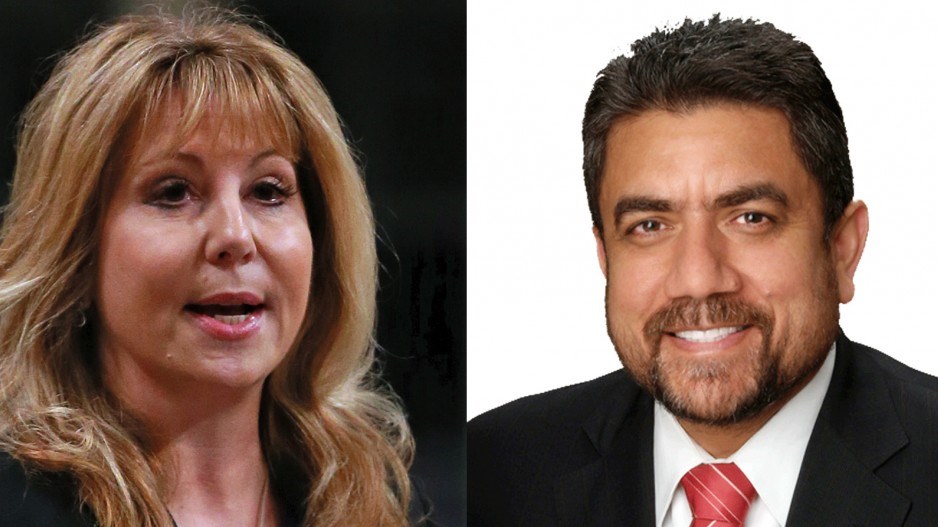Surrey’s former three-term mayor and current South Surrey-White Rock MP Dianne Watts is sounding alarm bells over the federal Liberal government’s infrastructure spending blitz.
Watts, who is the Conservative party’s critic for infrastructure, communities and urban affairs, noted a recent Parliamentary Budget Office (PBO) Labour Market Assessment that states over the past year Canada’s job creation rate was “half the average” it had been over the previous five years.
Watts said the government’s plan to stimulate long-term economic growth through infrastructure investment spending, which would require the country to run a deficit until 2019, is not working.
“We can clearly see it’s not performing the way the Liberals had thought that it would,” Watts said. “Partly because in Phase 1 the money went to road repair and maintenance and data collection and things like that. As important as they are, they’re not job creators.”
The PBO report did note that the job-creation slowdown “is consistent with the aging of Canada’s workforce” and that job gains will average about 8,000 net jobs per month until 2019, as “population aging is offset somewhat by cyclical improvements in the economy.”
However, the report predicts job gains will then slow to about 4,000 a month from 2020 to 2025 as “boomer cohorts” continue to retire from the labour force.
Watts said the best way to cut through the partisan back-and-forth on the issue of job growth and the benefits of infrastructure spending is to consult the PBO, which operates independently from government oversight.
“What we’re hearing right now [from the Liberals] does not look good,” continued Watts, adding that Finance Minister Bill Morneau lowered projections in his fall economic statement, which proposes an additional $81 billion through to 2027-28 for public transportation and various infrastructure projects. Morneau also announced the government will establish the Canada Infrastructure Bank, “an arm’s-length organization dedicated to increasing investment in growth-oriented infrastructure.”
Watts said this money is going to the wrong places and should be focused on raising job numbers in the short term. “I think they need a new game plan,” she said. “The money is being spent in a way that is not producing results.”
Sukh Dhaliwal, Liberal MP for Surrey-Newton, said in an email response to Business in Vancouver that Watts’ comments do not accurately reflect the PBO’s findings.
“The report clearly states that ‘Budget 2016 outlined $5.3 billion in investment in housing and infrastructure in 2016-17.’ And that ‘the first quarter has observed a large increase, $1.22 billion, in grants and contributions which have been disbursed at a rate unprecedented compared to recent years.’”
The PBO report also said the Canadian economy operated 1.2% below its potential in the third quarter of 2016, and that part of the cause was “below-trend” figures in hours worked and a rise in part-time employment.
Cascadia corridor
Watts said that while the federal economic outlook remains sluggish, B.C. continues to remain a bright spot. A recent report by RBC Economics Research noted B.C. added 50,000 new jobs since the end of 2015, largely in the retail trade and technology sectors. Watts said B.C. may want to continue increasing its focus south rather than east.
“I think that it’s important to really look at all opportunities to diversify,” said Watts. “B.C. is situated in the Cascadia corridor, which runs all the way down the west coast of North America.”
In September Premier Christy Clark held a joint announcement with Washington state Gov. Jay Inslee in which the two signed a memorandum of understanding “affirming their shared interest in creating regional economic opportunities for innovation in the technology sector.”
The announcement drew substantial press as Microsoft (Nasdaq:MSFT) founder Bill Gates joined Clark and Inslee for a subsequent conference in Vancouver. In a blog post on Microsoft’s website the software giant said high-speed rail between Vancouver and Seattle could be a potential transportation infrastructure project to spur growth. Watts, who met yearly with various representatives concerning the Cascadia corridor while mayor of Surrey, said part of the problem is not that Canada isn’t producing technology talent, it’s that much of the talent is leaving the country to find better-paying jobs.
“They go to the States or they go over to Europe, especially in technology, and the reason that they do that is that they can’t access their own market here,” she said. “So the procurement issue is significant.”




